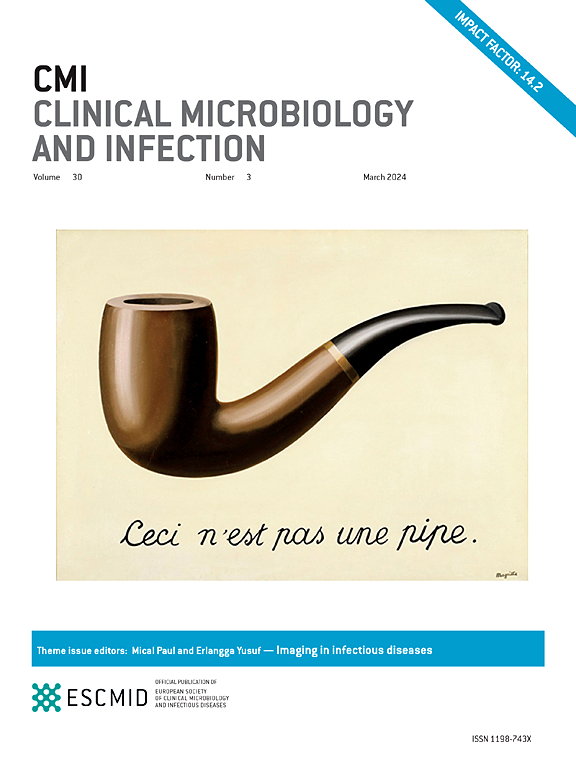传染病伦理:全球调查。
IF 10.9
1区 医学
Q1 INFECTIOUS DISEASES
引用次数: 0
摘要
目标:COVID-19 在被忽视的传染病伦理 (IDE) 领域揭示了新的伦理问题。我们对 IDE 专业人员的参与情况进行了调查:方法:我们在 2021-2022 年期间开展了一项全球调查。根据人口统计学、世卫组织地区、收入和伦理培训对回复进行了分层。通过确证因子分析(CFA)确定了代表IDE相关领域的两个主题(主题1,包括污名化、不公平、脆弱性、公共卫生和全球影响)和新出现的主题(主题2,包括COVID-19中的不公平和研究诚信、伦理兴趣的增加以及IDE中的差距)。定量和逻辑回归分析调查了伦理主题和应答者伦理态度的决定因素:我们纳入了来自 71 个国家的 477 名参与者。大多数参与者为女性(282/460,61%)和临床医生(327/457,72%)。参与者主张个人(289/443,65%)或社会(374/450,83%)进一步参与生物伦理。只有 5%(22/477)的受访者声称已经接受了足够的生物伦理培训,28%(114/412)的受访者对培训不满意。专门课程或专家案例讨论是接受生命伦理学教育的首选方式。主题 1 和主题 2 的中值均高于 7(1-10 分制),表明对 IDE 很感兴趣。CFA 分别显示出最佳拟合度和可接受拟合度。来自美洲地区与主题 1 相关,而接受过生物伦理培训与这两个主题相关。女性、接受过生命伦理学培训的受访者、来自美洲和欧洲地区的受访者参与生命伦理学活动的程度较低,而年龄在 44-54 岁之间、接受过生命伦理学培训的受访者参与程度较高。55 岁以上和非临床角色与进一步参与生物伦理活动的愿望呈负相关:我们确定了 IDE 主题,这些主题可为生物伦理方面的差距提供信息。伦理培训与对 IDE 和生命伦理学活动的兴趣有关,应提供伦理培训,以便将这门学科融入不同年龄、性别和全球不同地区的日常临床实践中。本文章由计算机程序翻译,如有差异,请以英文原文为准。
Infectious diseases ethics: a worldwide survey
Objectives
COVID-19 unravelled new ethical issues in the neglected field of infectious diseases ethics (IDE). We investigated IDE involvement among infectious diseases professionals.
Methods
A global survey was disseminated during 2021–2022. Responses were stratified by demographics, WHO region, income, and ethics training. A confirmatory factor analysis was used to identify two themes representing IDE relevant areas (theme 1, including stigma, inequity, vulnerability, public health, and global impact) and emerging topics (theme 2, including inequity and research integrity in COVID-19, increased ethics interest, and gaps in IDE). Quantile and logistic regression analyses investigated determinants of ethics themes and responders' ethics attitude.
Results
We included 477 participants from 71 countries. Most were females (282/460, 61%) and clinicians (327/457, 72%). Participants advocated further personal (289/443, 65%) or societies' (374/450, 83%) involvement in bioethics. Only 5% (22/477) of respondents claimed to have received enough bioethics training and 28% (114/412) were dissatisfied with it. Dedicated courses or expert case discussion were the preferred ways for receiving education in bioethics. Theme 1 and 2 median values were above 7 (on a 1–10 scale), showing high interest in IDE. Confirmatory factor analysis showed optimal and acceptable fit, respectively. Being from the region of Americas was associated with theme 1, whereas having received bioethics training was associated with both themes. Females and respondents from the Americas and Europe regions reported lower involvement in bioethics activities, whereas those aged between 44 and 54 years and trained in bioethics were more involved. Age above 55 years and nonclinical role were negatively associated with aspiration for further bioethics involvement.
Discussion
We identified IDE themes that can inform on gaps in bioethics. Ethics training was associated with interest in IDE and bioethics activities and should be offered to integrate this discipline into daily clinical practice across age, gender, and different areas worldwide.
求助全文
通过发布文献求助,成功后即可免费获取论文全文。
去求助
来源期刊
CiteScore
25.30
自引率
2.10%
发文量
441
审稿时长
2-4 weeks
期刊介绍:
Clinical Microbiology and Infection (CMI) is a monthly journal published by the European Society of Clinical Microbiology and Infectious Diseases. It focuses on peer-reviewed papers covering basic and applied research in microbiology, infectious diseases, virology, parasitology, immunology, and epidemiology as they relate to therapy and diagnostics.

 求助内容:
求助内容: 应助结果提醒方式:
应助结果提醒方式:


